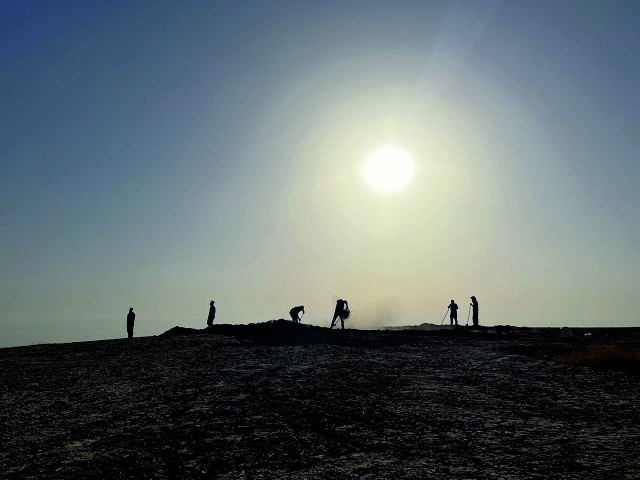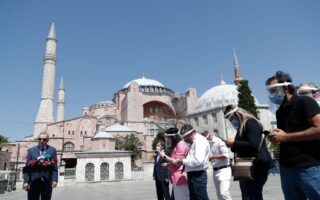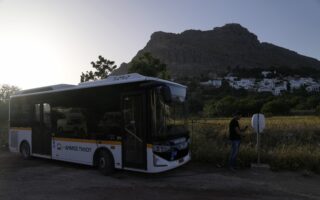When archaeologists swap trowels for guns
Two researchers from northern Iraq are at Athens University learning how to protect Erbil’s artifacts after defending them against ISIS
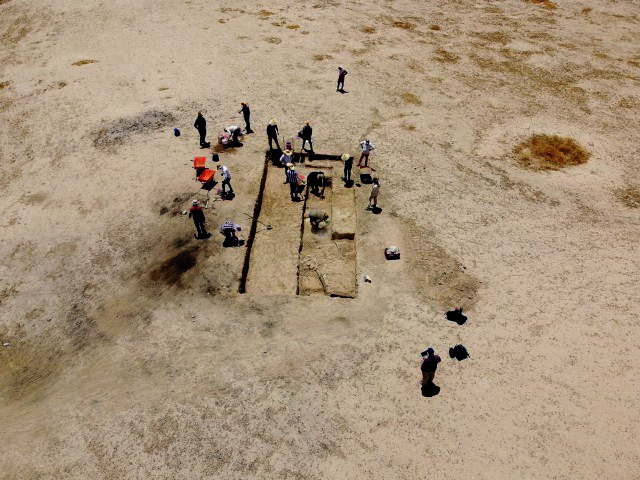
He knew how to handle a gun, but had no experience of battle. Yet in the summer of 2014, archaeologist Pshtiwan Ahmed had to step into the role of guard at the Erbil Civilization Museum in the autonomous district of Iraqi Kurdistan, when the proper security guards were sent to the front, along with all the other reserves, to stop the expansion of ISIS. He and other colleagues split the work of defending the displays into 12-hour shifts. Mosul had already fallen without resistance and the enemy was at the gates. Would they suffer a similar fate?
“Of course we were scared,” says the 38-year-old archaeologist. “We had seen that ISIS was targeting antiquities to destroy or loot them, and we were wondering how we would protect our families and our city, as well as our museum.”
Developments were so rapid, it was impossible to come up with some viable plan to hide or remove the museum’s exhibits to a different location. The Erbil Civilization Museum may have had only three display rooms, but its storage areas were packed with artifacts and recent excavation finds. One contingency plan had been to have three trucks on standby to save whatever could be saved in the event of an emergency. When it came down to practicalities, though, the plan had to be abandoned because no one could say where it would be safe to take the artifacts. The only solution at that moment was to arm the staff of the archaeological service and to assign them to guard duty, even though they had no experience of such matters.
“It was an enormous responsibility, but it was impossible to move all the antiquities. There simply wasn’t enough time,” says Awder Masralddin, an employee at the General Directorate of Antiquities of the Kurdistan Regional Government, explaining that a similar strategy had been applied at other museums in northern Iraq as well.
The only solution at that moment was to arm the staff of the archaeological service and to assign them to guard duty, even though they had no experience of such matters
The new “guards” also had to work convincing others in the area involved in the task of defending the museum, he adds. “We tried to tell them that the antiquities belong to all of us and we all have a duty to protect them,” says Ahmed, a man so softly spoken it’s almost impossible to imagine him in the heat of battle.
The assault by the jihadists was eventually stopped several kilometers outside of Erbil and the caliphate ISIS was trying to establish never spread to that city. Nevertheless, the effort to protect the city’s archaeological treasures and to showcase them to the world has not ended. The two archaeologists, in fact, recently enrolled in the English-language master’s degree course at the University of Athens on the archaeology of ancient Greece and the Middle East from prehistoric times until the end of the Hellenistic period. They are part of a group of 17 students taking the course from the United States, Germany, Korea and other countries. One of the subjects being taught is how a museum must photograph and create a record of its collection as a safeguard against losses and damage. The aim for the two archaeologists is to return to Erbil and put together a detailed digital catalogue of all the antiquities in the city, which would allow authorities to identify and track them in the event that they are looted.
Their presence in Athens is the result of a partnership between the University of Athens and the archaeological service of northern Iraq that dates back several years. In 2016, the head of the Erbil Directorate of Antiquities, Nader Babakr Muhammad, had come to Greece to speak to undergraduate and postgraduate archaeology students at the university and to meet with officials at the Ministry of Culture. “We are bound with our antiquities; if they are destroyed it will be like losing a part of our soul,” he told the students in a lecture, outlining the wealth of artifacts in the area of his jurisdiction.
Erbil was shut off to all foreign archaeologists under Saddam Hussein, but that gradually changed after he was overthrown and in the summer of 2014, before ISIS’ approach, at least 45 foreign missions from 16 countries were conducting research in the Kurdish section of Iraq.
The foreign missions
Konstantinos Kopanias, an associate professor of East Mediterranean archaeology at Athens University, had worked on excavations in northern Iraq with teams of Greek researchers and students in 2011, 2012 and 2013. The last time they were there, he had also worked with Pshtiwan Ahmed, who had been appointed as the guide to their mission. “I was there in December 2013, when we wrapped up the excavation. Everything was quiet, optimistic, and we had been planning our trip back in 2014 when Mosul suddenly fell in June and was followed by the attempted invasion of Erbil. The soldiers went off to the front, many civilians fled and the archaeologists were left defending the museum. If the jihadists came, they would not have fled; they would have stayed to fight,” he says.
Many foreign university missions canceled their excavation plans or left the area entirely under the ISIS threat. Kopanias says that some archaeologists decided to stay, including one mission that continued digging just a few kilometers from the main battlefield.
The risks, however, were great and the Greek mission did not return to Erbil in 2014. There was a lot of debate at the time over whether the jihadists were mainly destroying antiquities (several videos showed them blowing up archaeological sites and smashing artifacts with sledgehammers) or were selling them on the black market to bankroll their war. Once ISIS was rooted out of Mosul and the hostilities died down, reliable information indicated that many artifacts had been looted from Iraq and Syria and possibly been sold on the black market via Turkey. Kopanias also mentions satellite images of archaeological sites in occupied parts of the two countries that had been studied by experts, who identified new digging sites, an indication of illegal excavations.
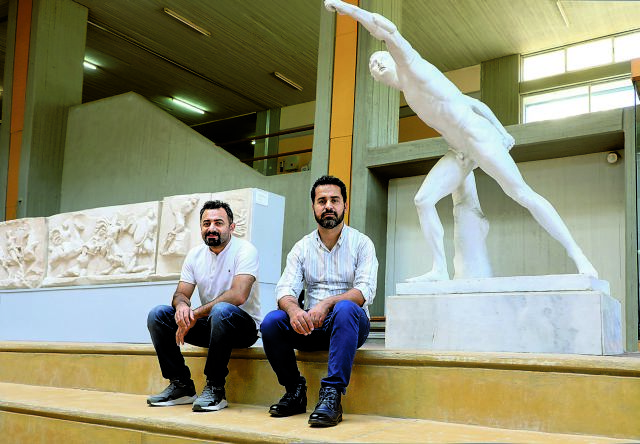
The Greek excavations in Iraq and the master’s degree
The Athens University mission returned to Erbil in the summer of 2022. The team spent two weeks in June working on Tell Nader, an archaeological site dated to the late 5th millennium BC. It had been identified in 2010 when digging for an irrigation pipe unearthed a jar burial that appeared to belong to the second half of the 2nd millennium BC. The Greek mission discovered the ruins of a residence there this summer and had earlier found evidence of a pottery workshop, as well as a kiln of sorts that may have been used to smelt metal.
The team also returned to its second second site, at Tell Baqrta, some 30 kilometers southwest of Erbil. “We found the site in good condition,” says Kopanias, noting that it’s close to the area where the heaviest battles with ISIS had taken place. “It’s one of the biggest sites in the Near East, covering an area of 100 hectares. It was an entire ancient city built around an acropolis,” says Kopanias, who was joined on this summer’s mission by PhD candidates Erato Vemou and Panagiota Barlagianni.
As was the case on the previous mission, several locals approached the excavation sites to watch the team at work. The team made a point of making them feel welcome, cautious about cultivating a climate of mistrust and far-fetched speculation about treasures. Kopanias remembers one man coming forward to say that he had found an artifact in the ground and took it home for safekeeping. It turned out to be a large stone tool from a hand-operated mill that the man turned over so it could be sent to the local museum. It was the first time Kopanias encountered such an incident.
Pshtiwan Ahmed and Awder Masralddin tell Kathimerini how important this contribution from foreign universities is. Archaeological research requires significant resources and the hostilities with ISIS had taken up a large chunk of the local government’s budget. The foreign missions have programs that allow them to overcome the problems with budgets, while the exchange of know-how is also valuable. “Our area is one of the richest in terms of finds and it hasn’t even been thoroughly searched yet,” says Ahmed. “It has a lot of important prehistoric monuments.”
When they’re not attending classes or studying, Ahmed and Masralddin are exploring Greece. So far, they’ve visited Ancient Olympia and Delphi, but the course is a year long and they’ll get to see much more.
“The collaboration we have with Greece is important,” says Masralddin. “We’re proud to be studying here.”
